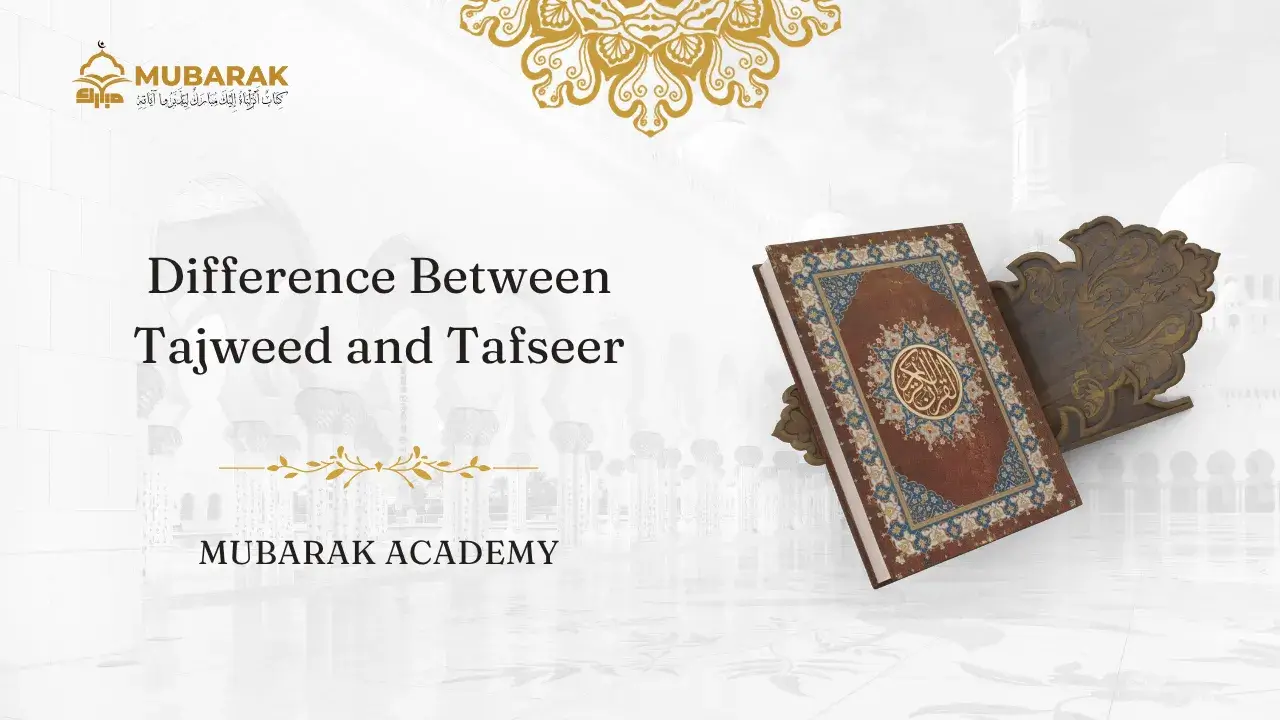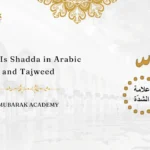The Qur’an is not just a book to be read, it is a message to be understood, lived, and felt in every recitation. To truly connect with its words, we need both Tajweed to recite it as it was revealed and Tafseer to understand its divine meaning. Understanding the difference between Tajweed and Tafseer allows us to perfect both our recitation and our comprehension, unlocking a complete Qur’anic experience.
These two sciences work hand-in-hand, guiding the tongue to recite beautifully and the heart to absorb its wisdom deeply.
What Does Tajweed Mean?
In the context of the Qur’an, Tajweed refers to the rules of proper pronunciation when reciting the Qur’an, giving each letter its correct sound and characteristics, just as the Prophet Muhammad ﷺ recited it. By studying the difference between Tajweed and Tafseer, learners understand that Tajweed is about precision in sound, while Tafseer is about clarity in meaning.
What Tajweed Covers
- Correct pronunciation of Arabic letters
- Proper rules of stretching (Madd)
- Rules of stopping and pausing (Waqf)
- Nasal sounds (Ghunna)
- Merging, hiding, or clarifying letters (Idgham, Ikhfa, etc.)
Why Tajweed Matters in Reciting the Qur’an?
Tajweed is important because it helps you recite the Qur’an as it was revealed and as the Prophet Muhammad ﷺ recited it.
It protects the words of Allah from being changed, mispronounced, or misunderstood.
Key Reasons Tajweed Matters:
- Preserves correct pronunciation and prevents changes in meaning.
- Honors the Qur’an by reciting it properly and beautifully.
- Helps the reciter gain khushu’ (focus & humility).
- Strengthens memorization and understanding.
- Continues the authentic way of recitation passed down from the Prophet ﷺ.
Read More About: What Is Tajweed in Quran, Its Rules, Symbols & Importance

What Is Tafseer?
Tafseer (التفسير) is the science of explaining, interpreting, and clarifying the meanings of the Qur’an. It helps readers understand the context of verses, why they were revealed, their linguistic meanings, and how to apply them in daily life.
Famous Tafseer Books:
-
- Tafseer Ibn Kathir
- Tafseer al-Tabari
- Tafseer al-Qurtubi
- Tafseer Sa‘di
Example:
فَإِنَّ مَعَ الْعُسْرِ يُسْرًا
[Indeed, with hardship comes ease](Surah Ash-Sharh, 94:6)
According to Tafseer Ibn Kathir, Allah assures believers that no hardship is permanent — with every challenge, Allah provides relief and support.
The verse uses the word “مع” (with) instead of “after,” to emphasize that ease accompanies difficulty at the same time, not only afterward.
Why Tafseer Matters in Understanding the Qur’an?
Reciting the Qur’an beautifully is wonderful, but it doesn’t guarantee that we actually understand what we’re reading. The Qur’an isn’t just meant to sound great; it’s meant to guide us. That’s where Tafseer comes in.
Tafseer helps us connect with Allah’s message, not just by reading the words, but by learning who the words were addressed to, why they were revealed, what they meant in their original setting, and how we can live by them today. Without Tafseer, we might recite the Qur’an perfectly, yet miss its deeper lessons and moral calls.
When you combine the elegance of correct recitation (Tajweed) with the insight of genuine interpretation (Tafseer), something powerful happens: you move from simply reading the Qur’an to deeply understanding and applying it.
Discover What Is Sifaat in Tajweed with Simple Examples
Main Difference Between Tajweed and Tafseer
Understanding the difference between Tajweed and Tafseer means appreciating how both complement each other (One guides your voice, the other guides your heart and mind). Here’s the main difference between Tajweed and Tafseer:
| Feature | Tajweed | Tafseer |
|---|---|---|
| Definition | The art and rules of reciting the Qur’an correctly and beautifully. | The explanation or commentary of the Qur’an’s verses (what they mean, their context, and their wisdom). |
| Focus | How you recite: pronunciation, articulation, rhythm, tone. | What the text means: digging into its meaning, context, rulings, and lessons. |
| Purpose | To honor the Qur’an by reciting it as it was revealed, preserving its sound and form. | To deepen your connection with the Qur’an by understanding its message and applying it in life. |
| Skill Required | A practical skill: mastering the rules of recitation, correct articulation, sound, and rhythm. | A more scholarly discipline: interpretation, language knowledge, historical context, and reflection. |
| Examples | Idhhaar (إظهار) — when a Noon Sakinah or Tanween is followed by one of these letters: ء، هـ، ع، ح، غ، خ. Example: مِنْ هَادٍ (“min haadin”) showing clear pronunciation without nasalization. |
Explaining the verse وَأَطْعَمَهُم مِّن جُوعٍ وَآمَنَهُم مِّنْ خَوْفٍ — understanding it as a reminder of how Allah blessed Quraysh with safety and provision. |
In simple terms, Tajweed is about the “how” — how to pronounce, pause, and beautify your recitation.
Tafseer is about the “what” and “why” — what the verses mean, why they were revealed, and how they guide your life.
Together, they complete your Qur’anic journey: Tajweed helps you recite Allah’s words with excellence, while Tafseer helps you live by them with understanding and reflection.
Learn Also: Difference Between Tajweed and Tarteel
How Our Online Course Helps You Master Tajweed & Tafseer?
At Mubarak Academy, your trusted Online Quran Academy, we make learning the difference between Tajweed and Tafseer simple and inspiring. You’ll begin with Tajweed, perfecting pronunciation and fluency. Then, you move into Tafseer, where you explore the deeper meaning, context, and wisdom of each verse.
With patient, qualified tutors, live interactive classes, and flexible scheduling, you don’t just learn the Qur’an, you connect with it, understand it, and live by it.
Recommended Courses:
- Quran Memorization Course
- Tajweed Quran Online Course
- Islamic Studies Course
- Arabic Language Course
- Quran Ijazah Course
Conclusion
When you truly understand the difference between Tajweed and Tafseer, the Qur’an becomes more than words on a page; it becomes a living guide for your heart and soul.
Tajweed teaches you how to recite every verse with care and beauty, while Tafseer helps you uncover the wisdom and lessons behind those verses. Together, they let you feel, understand, and live the message of Allah more deeply.
At Mubarak Academy, we help you master both step by step, with patient teachers and meaningful lessons that bring clarity and connection. So, you’ll find yourself not just reading the Qur’an, but truly living it.
Contact Us Now For More Details!
Frequently Asked Questions
1. Can I learn Tafseer before Tajweed?
Yes, but it’s highly recommended to first establish correct recitation through Tajweed so that your understanding (Tafseer) is built on a strong foundation.
2. Does Tajweed guarantee understanding of the Qur’an?
No, the purpose of Tajweed is to recite the Qur’an correctly and beautifully, while Tafseer focuses on understanding the meaning, context, and application of the verses.
3. How long does it take to master both disciplines?
It depends on your consistency and how often you practice. With regular lessons, most students become proficient in both Tajweed and Tafseer within months.
Keep in mind: your pace will also depend on how many classes you choose each month. Want a clearer plan? See our available Pricing & Plans.
4. Do I need to be an Arabic speaker to study Tafseer?
Not necessarily. While knowing Arabic gives you an edge, many Tafseer programs are designed in other languages and gradually strengthen your Arabic over time.
At Mubarak Academy, we’re committed to being your first choice for both the Holy Qur’an and the Arabic language, as we offer innovative lessons, interactive learning environments, and all-age support to help you understand deeply and grow with the Qur’an.
5. How does the online course at Mubarak Academy work?
The course uses live classes, personalized feedback, recitation assignments, Tafseer sessions, and flexible hours to help you master both Tajweed and Tafseer..




